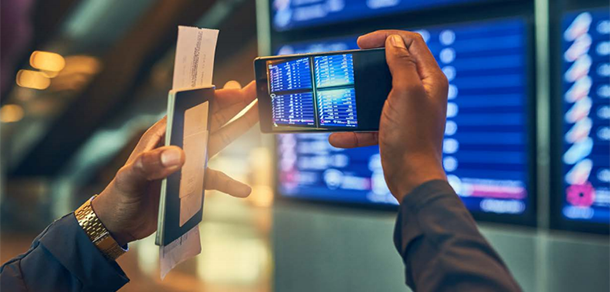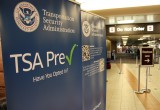Can blockchain-enabled ID make travel more secure and efficient?
20 February, 2018
category: Corporate, Digital ID, Government, Transit
The technology that helps power bitcoin transactions could also help officials authenticate airport passengers, under a blockchain-enabled ID pilot that has the backing of Canada and the Netherlands.
The blockchain-enabled ID program relies upon an app that travelers would use to store and share travel details with authorities before reaching airport screening lanes
The effort seeks to test the efficiency of using blockchain for a digital travel ID system. It would not only confirm identities of those travelers but build their credibility, resulting in them spending less time in screening lanes—in exchange for offering more personal details than other travelers. As a result, border authorities would then have more time to focus on travelers with less “credibility.”
The project, called the Known Traveler Digital Identity System, has the backing of the World Economic Forum. The prototype being tested with a select group of travelers relies upon an app that travelers would use to store and share travel details with authorities before reaching airport screening lanes—before landing at an international airport, for instance. Those details might include permanent resident cards, flight history, relatives travelling with the passenger and vaccination records. Authorities also would have access to such biometric data as digital representations of travelers’ fingerprints and faces. Blockchain technology would secure the data.
Blockchain-enabled ID could help ease congestion at airports
“Leveraging new technological advancements can support risk-based approaches to public safety and security,” Marc Garneau, Minister for Transport of Canada, said in a statement. “This will make air travel more efficient while improving the travel experience.”
If successful, this decentralized travel ID program would help airport and travel authorities deal with an expected spike in air travel and all the headaches that might bring, according to a recent paper about the Known Traveler Digital Identity System from the World Economic Forum. Cross-border travel will increase 50 percent over the next decade, with international arrivals reaching 1.8 billion by 2030, according to U.N. estimates.
“To take full advantage of the economic opportunities this increase in demand generates, stakeholders must confront pressures on the traveler journey, particularly the increased risk and related security requirements, as well as the limited growth capacity of travel- and border-related infrastructure,” the paper said. “Experts suggest that the monetary and economic costs of the current aviation security system will reach unsustainable levels in the coming decades.”
A blockchain-enabled ID is one approach to mitigate these unsustainable and rising costs. According to the report, “digital innovations in travel security coupled with multi-stakeholder collaboration will unlock solutions to the challenges of today.”




